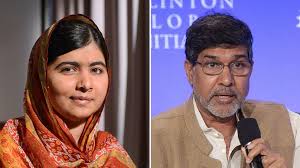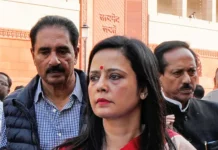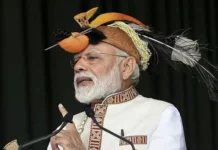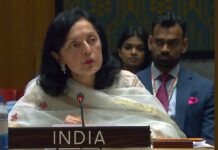 OSLO: An Indo-Pak and Hindu-Muslim combination of Kailash Satyarthi and Malala Yousafzai today shared the Nobel Peace Prize honors for 2014 for their work on promoting child rights in the troubled sub-continent.
OSLO: An Indo-Pak and Hindu-Muslim combination of Kailash Satyarthi and Malala Yousafzai today shared the Nobel Peace Prize honors for 2014 for their work on promoting child rights in the troubled sub-continent.
60-year-old Satyarthi, who runs an NGO in India that has been in the forefront of rescuing children from forced labor and trafficking, and 17-year-old Malala, who shot to limelight after the Taliban militants pumped bullets into her for advocating education for girls, were named by the Nobel Peace Prize Committee for the top global award this year.
“The Norwegian Nobel Committee has decided that the Nobel Peace Prize for 2014 is to be awarded to Kailash Satyarthi and Malala Yousafzai for their struggle against the suppression of children and young people and for the right of all children to education,” the jury said.
Satyarthi, who runs NGO Bachpan Bachao Aandolan (Save Childhood Movement), has maintained the tradition of Mahatma Gandhi and headed various forms of peaceful protests, “focusing on the grave exploitation of children for financial gain,” the Nobel committee said.
The Committee said it “regards it as an important point for a Hindu and a Muslim, an Indian and a Pakistani, to join in a common struggle for education and against extremism.”
Malala, who was nominated in the peace prize category, last year also, had displayed tremendous courage even after the Taliban attack when she resolutely expressed her determination to carry on with her campaign for child rights and girls education especially in a country like Pakistan.
She has become the youngest Nobel laureate. Satyarthi, the second Indian after Mother Teresa to be named for the peace prize, and Malala join a select league of eminent international personalities who have shared the Nobel Peace Prize for their outstanding work in furthering world peace and in other fields.
Malala, who was airlifted to Queen Elizabeth hospital in Birmingham where she was treated for life-threatening injuries, continued to campaign for girls’ education.
She addressed the UN last year, met US President Barack Obama and was named one of ‘Time’ magazine’s 100 most influential people. Last year, she published her memoir ‘I Am Malala’.
In the statement, the committee said: “Despite her youth, Malala Yousafzai has already fought for several years for the right of girls to education, and has shown by example that children and young people, too, can contribute to improving their own situations.
“This she has done under the most dangerous circumstances. Through her heroic struggle she has become a leading spokesperson for girls’ rights to education.”
This year’s record number of 278 nominees included Pope Francis and Congolese gynecologist Denis Mukwege, although the full list was kept a secret.
In 1993, F W de Klerk, the last president of South Africa in the apartheid regime, and Nelson Mandela were named for the award for their work for ending the apartheid regime. Next year, Israeli leaders Shimon Peres and Yitzhak Rabin shared the honors with Palestinian leader Yasser Arafat for their work in reducing tensions in the Middle East.
While in 1997 John Hume (Northern Ireland) and David Trimble (Britain) won the peace prize for their efforts to find a peaceful solution to the conflict in Northern Ireland.
Nobel, a wealthy Swedish industrialist who invented dynamite, provided few directions for how to select winners, except that the prize committees should reward those who “have conferred the greatest benefit to mankind”.–PTI






